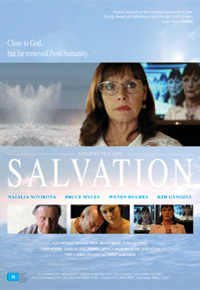
SALVATION
Australia, 2008, 97 minutes, Colour.
Wendy Hughes, Bruce Myles, Natasha Novak, Kym Gyngell, Alex Menglet, Richard Piper, Maggie Miles, Chris Haywood, Terry Norris, Charles Tingwell, Monica Maughan, Deidre Rubenstein, Tony Llewellyn- Jones, Barry Humphries.
Directed by Paul Cox.
Salvation is a satire on the media but, especially, fundamentalist religious media. It is in the vein of Paul Cox’s satiric Lust and Revenge. It is also reminiscent, in the character played by Bruce Myles, of Norman Kaye as the Man of Flowers.
Wendy Hughes portrays a tele-evangelist, who has some great success with her TV congregation (although Wendy Hughes is not always so persuasive in her preaching and performance). She is supported by her husband Bruce Myles, who looks after her affairs for her. However, he feels he is neglected, is getting older, and seeks the company of a sympathetic Russian prostitute (Natasha Novak) and even spends time watching his wife’s programs with her.
There is a range of interesting characters including Kym Gyngell as Wendy Hughes’s rather passive assistant, Maggie Miles as another prostitute in Melbourne, Alex Menglet as the thug who organises the prostitute ring. There are also cameos by Paul Cox’s favourite cast, Chris Haywood as an architect, Terry Norris as a gallery guide explaining the artwork in a nude painting with Charles Tingwell and Monica Maughan as a disapproving couple. Deidre Rubenstein is Gloria’s media coach, Tony Llewellyn-Jones? a TV interviewer and Barry Humphries has a very interesting cameo as an old man, a pensioner, who goes to the prostitute and opts for the cheaper rate. Humphries, nothing like Dame Edna or his other characters, brings some pathos to this brief appearance. Cox himself appears briefly as one of those giving testimony as affected by Gloria’s preaching.
Paul Cox’s films are always interesting, slightly offbeat at times, small-budget, but effective and his career is made up of quite a number of significant films.
1. The work of Paul Cox, his career, small budgets? His regular casts? Technicians? His themes, perspectives on life, relationships, sexuality, art, religion, God and faith?
2. The serious Paul Cox, the comic Paul Cox? Sardonic humour, satire? Expectations?
3. The title, the Christian overtones, mainstream religion, charismatic religion, fundamentalist religion? Media religion? Churches, groups and responses? Money? The personal involvement of the leader? Yet superficial? Bible quotations? Contrasting beliefs in God, no belief? The effect of religion on the lives of those involved?
4. Melbourne and the suburbs, the houses, Gloria’s home, Irina’s homes, the brothel, the cafés, Barry’s brother’s shed?
5. The television world, studios, evangelism, the television screens? The background for performance? Choirs, musical score?
6. Wendy Hughes as Gloria: self-appointed, confident, her language about her vocation, American models of evangelism, the money and her concern, God willing her to have a facelift, her affluent lifestyle? Barry and her relationship, his managing her affairs, his advice? Her patronising attitude towards him? The phone calls when she was away? Her reliance on Tony, her relationship with him – and her getting confidence by having Barry or Tony lie on her? Tony’s reaction? Her watching her performances, the content, the style, her media coach, timing, expressions, action, body language? Her going on tour, the results? Her concerns, the return, her future? The architect and the panic room? The irony of its later use? Barry taking the money for Irina?
7. Barry and his story? In himself, his age, his marriage to Gloria, watching her on television, acquiescing in her wishes, leaving the practicalities to Tony? His painting, his flower-painting – and Gloria not liking it, Irina liking it? His sexual needs? Going to Irina, the discussions, the money, building a relationship, watching Gloria on TV with Irina? Discussing personal matters? His growing involvement with her, the gangsters and the prostitution ring? The atmosphere of violence? His deceiving Gloria, the phone calls? His going to talk to his brother, memories, mementoes? The issue of the money, his decision to let Irina have it? The encounters with Alex? The bluffing? Alex and his brutality, the agreement, the lure of the money, meeting, going down into the panic room? Barry trapping him there? Barry’s future – without Gloria, with Irina?
8. Irina and her background, her memories, the flashbacks, her mother, the family, expecting an ordinary life, finishing up in the brothel, her girlfriend and their conversations? In herself, her work, her clients? The Barry Humphries character and his manner, her kindness towards him? Liking Barry, coming to the meal at Barry’s house, meeting with Gloria, the tales spun for Gloria’s benefit? The sensual relationship, the music, sexual? Her being dependent on the thugs? Barry coming to her rescue? Her salvation?
9. Tony, passive, caught up with Gloria? Following her, organising her, the lying on top of her? His embarrassment?
10. The range of cameos with Cox regulars? The architect and the panic room? The gallery guide and his comments on nudity and art? The couple and their watching the art, their censorious comments? Barry Humphries as the old man, the pensioner, coming to see the prostitute, concerned about the cost? The TV interviewer and the interactions with Gloria?
11. How successful the film as serious, as comic, satiric? The points being made about characters, relationships, religion, self-confidence? Sexuality, compensation? Thugs and violence?